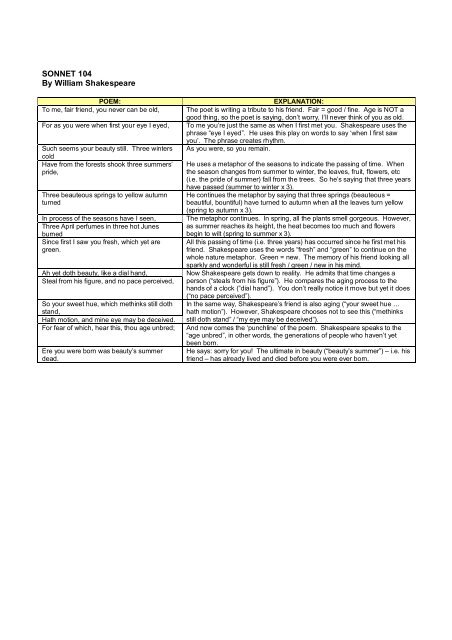Poetry Notes - Mrs-claassen.co.za
Poetry Notes - Mrs-claassen.co.za
Poetry Notes - Mrs-claassen.co.za
You also want an ePaper? Increase the reach of your titles
YUMPU automatically turns print PDFs into web optimized ePapers that Google loves.
SONNET 104<br />
By William Shakespeare<br />
POEM: EXPLANATION:<br />
To me, fair friend, you never can be old, The poet is writing a tribute to his friend. Fair = good / fine. Age is NOT a<br />
good thing, so the poet is saying, don’t worry, I’ll never think of you as old.<br />
For as you were when first your eye I eyed, To me you’re just the same as when I first met you. Shakespeare uses the<br />
phrase “eye I eyed”. He uses this play on words to say ‘when I first saw<br />
you’. The phrase creates rhythm.<br />
Such seems your beauty still. Three winters As you were, so you remain.<br />
<strong>co</strong>ld<br />
Have from the forests shook three summers’<br />
pride,<br />
Three beauteous springs to yellow autumn<br />
turned<br />
He uses a metaphor of the seasons to indicate the passing of time. When<br />
the season changes from summer to winter, the leaves, fruit, flowers, etc<br />
(i.e. the pride of summer) fall from the trees. So he’s saying that three years<br />
have passed (summer to winter x 3).<br />
He <strong>co</strong>ntinues the metaphor by saying that three springs (beauteous =<br />
beautiful, bountiful) have turned to autumn when all the leaves turn yellow<br />
(spring to autumn x 3).<br />
In process of the seasons have I seen, The metaphor <strong>co</strong>ntinues. In spring, all the plants smell gorgeous. However,<br />
Three April perfumes in three hot Junes as summer reaches its height, the heat be<strong>co</strong>mes too much and flowers<br />
burned<br />
begin to wilt (spring to summer x 3).<br />
Since first I saw you fresh, which yet are All this passing of time (i.e. three years) has occurred since he first met his<br />
green.<br />
friend. Shakespeare uses the words “fresh” and “green” to <strong>co</strong>ntinue on the<br />
whole nature metaphor. Green = new. The memory of his friend looking all<br />
sparkly and wonderful is still fresh / green / new in his mind.<br />
Ah yet doth beauty, like a dial hand, Now Shakespeare gets down to reality. He admits that time changes a<br />
Steal from his figure, and no pace perceived, person (“steals from his figure”). He <strong>co</strong>mpares the aging process to the<br />
hands of a clock (“dial hand”). You don’t really notice it move but yet it does<br />
(“no pace perceived”).<br />
So your sweet hue, which methinks still doth In the same way, Shakespeare’s friend is also aging (“your sweet hue …<br />
stand,<br />
hath motion”). However, Shakespeare chooses not to see this (“methinks<br />
Hath motion, and mine eye may be deceived. still doth stand” / “my eye may be deceived”).<br />
For fear of which, hear this, thou age unbred; And now <strong>co</strong>mes the ‘punchline’ of the poem. Shakespeare speaks to the<br />
“age unbred”, in other words, the generations of people who haven’t yet<br />
been born.<br />
Ere you were born was beauty’s summer He says: sorry for you! The ultimate in beauty (“beauty’s summer”) – i.e. his<br />
dead.<br />
friend – has already lived and died before you were ever born.



